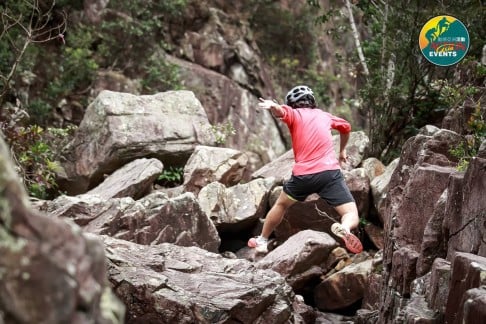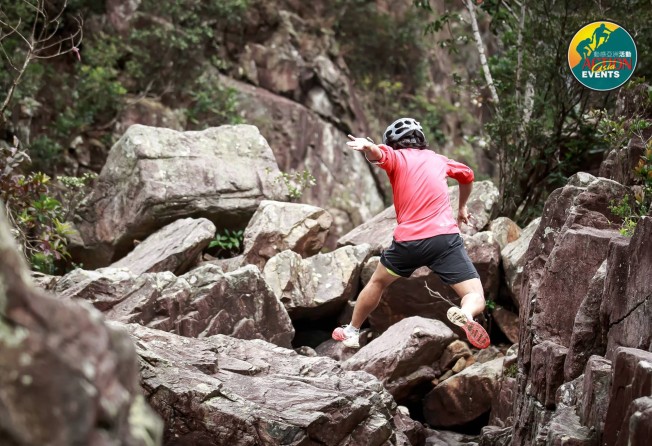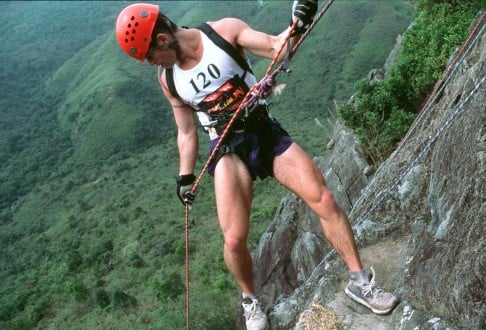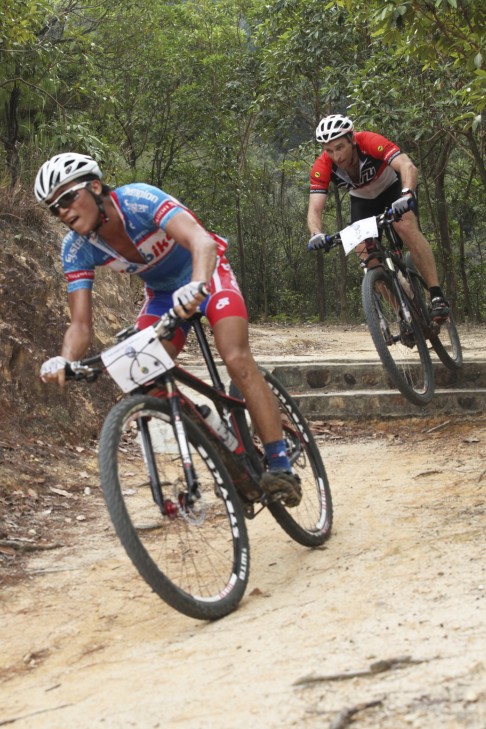
Curbs imposed on Hong Kong trail running 'to protect country parks'
Amid a boom in the sport, the government will insist on tight restrictions limiting race routes, timing and participation. Events face drastic changes - or could even be scrapped

Government regulation looks like bringing a recent surge in the popularity of trail running in Hong Kong to a shuddering halt. Several long-established races will have to change routes and start times drastically and limit participation. Some could even be scrapped.
The government says it is acting in the interests of public safety and to reduce disturbance to wildlife in the city's country parks in light of the increasing traffic on trails.
“This is not a change of rules, but we’re tightening up requirements,” said Ngar Yuen-ngor, AFCD’s senior country parks officer (North West).
The sport appears to have become a victim of its own popularity. Spots on the most popular events are filled within hours. The AFCD's move will make it even harder for adventure racers to secure places in events.
Race organisers told the South China Morning Post they were upset at the way the AFCD introduced what they said were new guidelines with no public consultation and no transparency.
Zein Williams, a top local trail runner, has set up a petition to allow running in Hong Kong’s rivers and gullies. The petition has garnered more than 1,000 signatures in a matter of days.
"These events have not only promoted healthy lifestyles, fitness and community in Hong Kong, they have also raised much needed funds for charity … Hong Kong’s youth are already facing many problems of obesity and inactive lifestyles; the government should be taking extra steps to support events ...," Williams writes.
Among the races affected are the Action Sprints and Action Asia Challenge organised by Action Asia Events.
These adventure races, which have been running for 16 years, often go off the main trails in country parks. Negotiating streams and gullies are just some of challenges that attract participants to the races, but it’s precisely because of these activities the AFCD has told race organiser Michael Maddess that no more permits will be issued for such races.

Maddess quoted the AFCD as saying: “Activities which may pose greater disturbance to natural environment and/or are more likely to cause public safety hazard will not be approved, such as cycling races at night, competitive activity on natural streams, etc.”

Night trail races, such as the Moontrekker, Lantau Base Camp’s Stairmaster series and XTE Dark 50 Mountain Marathon, are also affected. Race organisers say they’ve been told by the AFCD that permits will not be issued for such races to “reduce the disturbance to wildlife at nighttime”.
But Clement Dumont, a top local trail runner and race organiser who has a PhD in biology, said having people on the trails should not affect the wildlife since in Hong Kong the vegetation is quite dense and difficult to go through.
“If people stay on the trails, the vast majority of the country parks remain untouched and the wildlife remain undisturbed,” Dumont said.
Ngar said people were encouraged to go to the country parks during the day. “At night, without sunshine, people should go home, so that the country parks can return to their quiet place and wildlife can take their time to come out,” she said.
Over the last few years trail running and adventure races have seen a massive spike in popularity in Hong Kong. Even with the surge in the number of races – from 5km fun runs to 160km ultramarathons – demand is still outstripping supply: races are usually sold out and popular ones reach capacity in a matter of hours.
All 1,800 slots for this year’s Vibram Hong Kong 100 race in January, for example, were snapped up in just a couple of hours by participants from more than 50 countries. The event had just 250 participants in its inaugural edition in 2011.
Typically known just for shopping and food, Hong Kong has now developed an international reputation as a haven and destination for trailseekers. Races attract not only the world’s best runners, but also scores of weekend warriors who fly into the city just to experience the local trails.
The HK100 race in 2014 became part of the Ultra Trail World Tour, an international circuit of 100km races, while the MSIG 50km series by Action Asia Events is part of the International Skyrunning Federation’s Skyrunner World Series.

The AFCD said it issued about 300 permits for a wide range of events – from charity hikes to competitive events – organised in country parks in 2014.
Because of the AFCD's move, Action Asia Events’ Action Asia Challenge in May will do away with any stream activities, but Maddess emphasises that his events have posed no safety hazard to the public nor participants as noted by the AFCD. The most serious problems faced were a couple of participants getting dehydrated during races a few years ago, he says. He adds that his race routes are “carefully chosen” to make sure nature is not harmed.
The Translantau, the fourth edition of which was held a fortnight ago on Lantau Island and which offers distances ranging from 15km to 100km, was capped at 1,500 participants this year. Dumont, the race organiser, had initially targeted 2,500 participants, since the event had grown from 600 participants in 2012 to 2,000 last year.
“The AFCD asked me to significantly reduce the number of participants, to avoid night [running] to not disturb the wildlife, and [to] change my route to minimise the ecological impact,” said Dumont.
Felix Shum, director of Xtraventure Training and Events (XTE), who runs four night races that attract 300 to 500 people each, has changed all of them to daytime events. Similarly, Lantau Base Camp has switched both its Stairmaster races to the day.
The Moontrekker, meanwhile, will reduce its field from about 1,700 runners to 1,000, and use a revised route that goes along the catchwater rather than trails, Ngar said. The event, which began in 2010, is a 43km race in October that flags off from Mui Wo at 8.45pm and challenges participants to “beat the sunrise” on a course that goes over Sunset Peak and Lantau Peak.
On night trail events, the AFCD says: “Event organisers are specifically reminded of the difficulty in locating victims and carrying out rescue in case of emergencies at night if unmaintained trails are involved.”
Ngar said the department had been surveying the country parks at night for “quite a number of years” and found that the increasing number of events could threaten the wildlife, much of which is nocturnal.
Shum, of XTE, said there were a few reasons for holding a race at night. Runners could avoid running under the daytime heat in the summer, and enjoy a different perspective of the beauty of nature at nighttime. The races also promoted exercising in nature – not in air-conditioned gyms – after work during the summer.

Race organisers question why the Oxfam Trailwalker 100km race, Hong Kong’s largest trail running event – which has more than 4,000 competitors, thousands more supporters, and goes over two days – has faced no sanctions.
Ngar explained that the Trailwalker sticks to the Maclehose Trail, a main track that is maintained; the organisers have a “trustworthy” track record; the trails are cleaned up after the race; and the race is held only once a year.
Keith Noyes, organiser of the King of the Hills, Hong Kong’s oldest trail running series, and The North Face 100km, said it was “sad” that rules had been updated without any public consultation. He said policies should be consistent across all events.
He said if the AFCD was concerned that some race organisers fail to maintain the trails, then a code of conduct should be drawn up. “If people don’t adhere, then you sanction them or take away their ability to organise races in future,” said Noyes.
“Hong Kong authorities should be encouraging people to get outside and be healthy. The races definitely perform that objective of a healthier lifestyle,” he added. “If they’re worried about environmental impact, they should not allow any more paving of trails in Hong Kong because that’s [got] more environmental impact than any of the racers going through.”
Last week, the AFCD paved over more sections of the trail that leads from Pak Mong to Sunset Peak on Lantau Island. Ngar explained that while the AFCD’s principle is to avoid using concrete as far as possible, on some trails “we cannot avoid using hard material to strengthen the steps… particularly on steep sections to protect the soil from erosion.”
“Concrete is erosion-proof,” Ngar added. “The Pak Mong trail is near its completion stage; we’re doing the last few steps. Besides, we are no longer using any concrete – we’re using stone pavings which look much more natural.”
But Dumont said: “If that is not disturbing nature, what is it? Which is better, runners and hikers stepping on vegetation or scaring a snake, or destroying their habitat with concrete?”
Hong Kong authorities should be encouraging people to get outside and be healthy.
Ngar said the guidelines for organising events in country parks had been in place since 2008.
“Based on AFCD’s records, there has been an increasing demand from event organisers for holding more adventurous, competitive, and challenging activities that involve exploration of the wilderness zones of country parks. Besides, the number of participants, duration of events and number of country parks involved in the event proposals have also significantly increased in recent years.
“To ensure our natural environment is well protected and the potential public safety hazard is minimised, AFCD will closely monitor the impacts of such events, review our guidelines [for] granting permits and update the permit conditions whenever appropriate.”
In a statement to the Post, the AFCD said applications can only be submitted six months before the intended date of an event. Each application, it said, was "considered on its individual merits”.
“Permits granted for previous organised events should not pre-empt approval of any new but similar applications. Bearing in mind the main objectives that country parks serve, namely nature conservation, outdoor recreation and nature education, the authority will carefully consider the potential impacts of each proposed event on the natural environment, the sustainable use of natural resources, and any potential impacts on other country park users,” it said.
“The authority has to take into account the needs of the general public to leisurely enjoy the country parks and also the wish of the residents living in the vicinity not to be disturbed. Safety of all country park users including the event participants is of prime concern.”